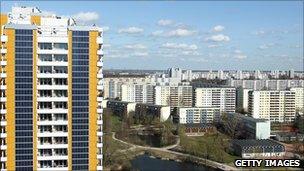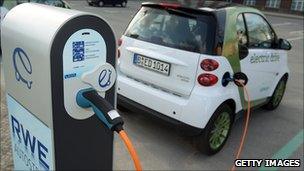Sluggish Europe seeks new energy boost
- Published
Europe tackles its energy-saving dilemmas
EU leaders are meeting to consider the 27-nation bloc's ambitious energy targets on Friday - even if the Egypt crisis and eurozone debt woes are a big distraction.
The EU's energy challenges, external are the focus of the European Council talks in Brussels - at least according to the official agenda.
The EU has set itself a "20-20-20" goal: a 20% cut in emissions of greenhouse gases by 2020, compared with 1990 levels; a 20% increase in the share of renewables in the energy mix; and a 20% cut in energy consumption.
Huge investment is needed to modernise Europe's energy infrastructure, external, and most of it will have to come from the private sector.
The goal is to make the EU's diverse economies more joined up, to reduce their reliance on imported oil and gas and to increase the share of renewables such as wind and solar power in the energy mix.
But progress towards a greener, more energy-efficient Europe is painfully slow, as governments are forced to tighten the public purse-strings and many companies struggle to get credit from banks.
The economic downturn means that the pace of urban renovation has slowed in many countries - and with it, the installation of eco-friendly buildings, with modern smart meters and efficient insulation.
But on the plus side, photovoltaic panels and other green innovations have got cheaper.
Developing networks
The European Commission, steering EU energy policy, says about 1tn euros (£850bn; $1.4tn) will have to be invested over the next 10 years to modernise energy generation and supply.

Solar panels on a Berlin block of flats: The cost of green technology has fallen
But with budgets tight throughout Europe more incentives will have to be found to get the private sector to commit to big energy projects, where the returns tend to be long-term.
The Commission reckons that about 60bn euros of EU budget funds will have to be invested in high-risk, cross-border projects deemed vital for Europe's future energy security.
Supply weaknesses in Central and Eastern Europe were highlighted dramatically in January 2009, when a Russian gas transit dispute with Ukraine meant that many other countries suffered a gas shortage. Millions of people were left without heating in sub-zero temperatures.
Many former communist countries, including Poland, Hungary and Slovakia, are overwhelmingly dependent on gas from Russia's Gazprom.
North-south energy connections are seen as a priority - to link the Baltic energy market to the rest of Europe and to help develop South-East Europe, where many people live in energy poverty, spending a relatively high amount of income on fuel bills.
The EU imports more than half of its energy supplies - equal to 2.5% of total EU economic output (GDP).
Europe looks south
With economic growth models still wedded to fossil fuels Europe remains hostage to rising energy prices and volatility triggered by events such as the Egypt crisis.
Energy diversification has become a mantra in Brussels, as the EU wrestles with Gazprom's leverage and competes for declining resources with energy-hungry emerging powers like China and India.
But making that diversification a reality is a big and expensive challenge.

Electric cars need many more recharging points to be viable in Europe
New partnerships are being forged with North Africa and Central Asia, to bring new sources of gas to European markets via a "Southern Corridor".
There are also technical challenges, such as engineering reverse gas flow, so that a shortage in one country can be eased by a neighbouring country pumping extra gas to it in an emergency.
An ambitious plan to develop wind power in the North Sea requires new grid connections in several countries.
In addition to the funding challenge, the time taken to get planning permission hampers big cross-border energy projects.
But Danish liberal MEP Jens Rohde, a vice-chairman of the European Parliament's industry and energy committee, says that "if you don't invest public money in the infrastructure you can forget all about wind power".
How to change behaviour?
If Europeans could become more energy-efficient then the pressure on dwindling resources would be eased and greenhouse gas emissions would also decline.
Yet the Commission has a bleak message on that front.
"Regarding energy efficiency, we are seriously lagging behind. By 2020 we will only reach half of the 20% target if we carry on at the current pace," Energy Commissioner Guenther Oettinger said.
He called for mandatory energy efficiency criteria in public building and transport projects.
Many European politicians say energy efficiency standards need to be made binding, in the way that CO2 emission limits were in the EU.
According to Mr Rohde, there is "no one-size-fits-all" because European tax systems vary so much. So incentives for energy-efficient behaviour will vary from country to country.
But countries are slow to embrace energy-efficient technology such as smart cars and new meters, Mr Rohde says, because the end result is lower consumption - which means less fuel tax revenue and smaller returns for energy firms.
The question of who pays for large-scale installation of smart technology has not been resolved, Giles Chichester MEP says.
Mr Chichester, an energy specialist in the European Conservatives and Reformists (ECR) group, says that making energy efficiency data compulsory in house sales was a useful innovation in the UK.
Lowering the sales tax (VAT) on work to modernise buildings would also help towards energy efficiency, he told the BBC.
"There is a case for public money to be invested in some basic efficiency, such as draught exclusion. There is a double benefit - better living conditions and jobs for local businesses," he said.
There is great scope for such projects in ex-communist Central and Eastern Europe, where many people still live in apartment blocks with wasteful, old-fashioned heating systems, he added.
- Published4 February 2011
- Published29 April 2010